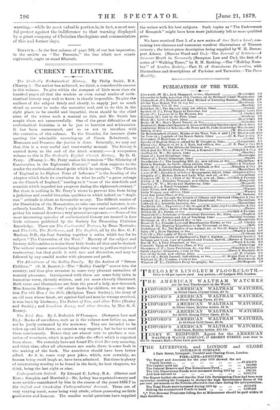CURRENT LITERATURE.
The Student's Ecclesiastical History. By Philip Smith, B.A. (Murray.)—The author has achieved, we think, a considerable success in this volume. To give within the compass of little more than six hundred pages all that the student or even casual reader of eccle- siastical history may seek to know, is clearly impossible. To give the outlines of the subject firmly and clearly, to supply just as much detail as serves to make the narrative real, and to do this in the right place, to be candid and impartial, these should be the chief aims of the writer such a manual as this, and Mr. Smith has sought them not unsuccessfully. One of the great difficulties of an ecclesiastical historian is to be just to heretics and schismatics. It has been surmounted, and so as not to interfere with the execution of this volume. To the Gnostics, for instance (here quoting the admirable summing-up of Canon Robertson), to Montanus and Donatus, due justice is (lone. Generally, we may say that this is a very useful and trustworthy manual. The history is carried down to the end of the tenth century.--A companion volume to this is The Student's English Church History. By G. G. Perry. (Murray.)—Mr. Perry makes his terminus " The Silencing of Convocation in the Eighteenth Century," and thus suggests to the reader the ecclesiastical stand-point which he occupies. " The Church of England at its Highest Point of Influence " is the heading of the chapter which finds its conclusion in what he calls "a gross outrage on the Church of England," tracing to it " most of the mischiefs and scandals which impeded her progress during the eighteenth century." But there is nothing in Mr. Perry's views to prevent him from being a judicious and candid historian, qualities to which indeed an "Angli- can " attitude is about as favourable as any. The difficult matter of the Dissolution of the Monasteries, to take one crucial instance, is ex- cellently handled. Mr. Perry's style is vigorous and correct, and alto- gether his manual deserves a very general acceptance.—Some of the most interesting episodes of ecclesiastical history are treated in four little volumes, published by the Society for Promoting Christian Knowledge. These are The Continental Teutons, by Dean Merivale ; and The Celts, The Northmen, and The English, all by the Rev. G. F. Maclear, D.D., the four forming together a series which has for its subject " The Conversion of the West." Mastery of the subject and literary skill combine to make these little books all that can be desired. The writers' course sometimes brings them near to perilous regions of controversy, but they guide it with tact and discretion, and may be followed by any candid reader with pleasure and profit.


































 Previous page
Previous page